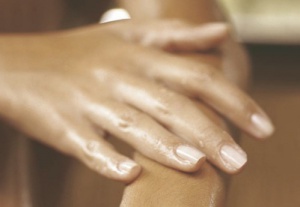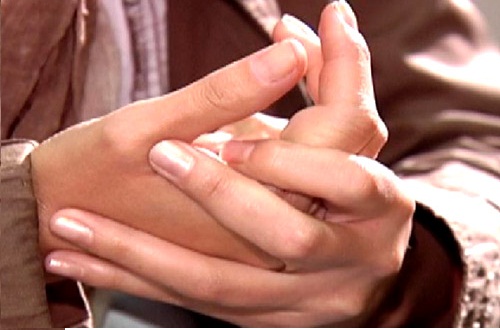Swollen Hands: Causes and Remedies


Written and verified by psychologist Valeria Sabater
Have you ever looked down at your hands only to find that your rings are pressing into your skin? Are your fingers swollen and discolored? Why does this happen? There are a number of reasons that you may get swollen hands. Most of them are not at all serious, but others are a sign of illness. Keep reading to learn more.
Why are my hands swollen?

On the other hand, if the swelling is only in one finger, it could be from some kind of injury or infection. However, you should always make sure that this swelling is not the result of a problem in your joints.
If you notice swelling in multiple fingers, pay close attention to the symptoms. When your whole hand is swollen, it’s usually a circulatory problem or metacarpal syndrome. If it’s just one finger, check your fingernails first, and then consider whether you bumped that finger somewhere or suffered some kind of injury. It could even be from a bug bite. But, if the swelling lasts for more than five days, make an appointment to see your doctor.
Possible causes of swollen hands
Read more: 5 Natural Solutions for Carpal Tunnel Pain
- Laceration or blunt trauma: Did you bang your hand into something? Did you pinch it? Did a dog bite you? These are things you would probably remember, but it’s possible that it happened and you quickly forgot. You might not get any swelling until hours later.
- Injured ligament or cartilage: If your work involves performing repetitive tasks with your hands and fingers, your fingers may swell as a result of injured cartilage.
- Bursitis (swelling of the fluid-filled sac that protects your joints). This is a very painful condition and sometimes a small, painful bump will appear.
- Carpal tunnel syndrome: This painful condition is very common in women. It involves pressure on a nerve that runs through the wrist, often causing swelling, loss of feeling, or stiffness in the hand and fingers.
Additional causes…
- Ganglion: This condition occurs when the upper part of the joint or tendon grows or swells. It can travel up to your fingers and cause swelling there as well.
- Infection: Infection is another common cause of swelling. A bacterial infection called Streptococcus aureus can cause painful, severe swelling in the fingers and sometimes fever.
- Paronychia: This condition is easier to identify because it tends to only affect one finger. This painful infection near the fingernail can cause swelling and puss.
- Rheumatoid arthritis: This chronic auto-immune disease that affects your joints is quite common. It often affects the fingers, causing pain and swelling.
- Septic arthritis: This infectious arthritis is difficult to differentiate from rheumatoid arthritis because the symptoms are usually the same. If you think you might have either one of these conditions, make an appointment with your doctor to get a proper diagnosis.
How can I reduce swelling in my fingers?
As we said before, if you find that the swelling in your hands lasts for several days, you should see a doctor. At home, however, you can follow these tips:
1. Cold and hot baths with rosemary water: Rosemary is great for reducing joint and cartilage swelling. You put two sprigs of this medicinal plant in hot water and then submerge your swollen hands for three minutes. Then, do the same with rosemary in a bowl of cold water. Switching back-and-forth between hot and cold helps improve blood flow and reduces swelling. To finish the treatment, massage your swollen hands with a few drops of rosemary oil.
2. If you suspect that the swelling in your fingers is the result of a bacterial infection, rub a garlic clove on the affected area. Garlic has natural antibacterial properties that may help reduce the infection and help with swelling.
You might like: What are the Health Benefits of Garlic?
3. Ginger root bandage: Ginger is a natural anti-inflammatory and could also help reduce swelling. First, grate a good amount of ginger root into hot water. Submerge your swollen fingers for a few minutes. Then, strain the grated ginger pulp from the water and apply it to the affected area without pressing too hard. This is another natural way to relieve swelling.
We hope you’ve enjoyed this article on the main causes and treatment of swollen hands!
All cited sources were thoroughly reviewed by our team to ensure their quality, reliability, currency, and validity. The bibliography of this article was considered reliable and of academic or scientific accuracy.
- Clínica Mayo. Artritis. Disponible en: https://www.mayoclinic.org/es-es/diseases-conditions/arthritis/symptoms-causes/syc-20350772.
- Clínica Mayo. Ganglión. Disponible en: https://www.mayoclinic.org/es-es/diseases-conditions/ganglion-cyst/symptoms-causes/syc-20351156.
- Carmés S, Werther J, Dumontier C (2018). Infecciones de la mano y de los dedos. EMC – Aparato Locomotor, 51(3), p1-23. Disponible en: https://www.sciencedirect.com/science/article/abs/pii/S1286935X1892753X
- Mashhadi N, Ghiasvand R, Askari G, et al (2013). Anti-oxidative and anti-inflammatory effects of ginger in health and physical activity: review of current evidence. Int J Prev Med, 4(Suppl 1):S36-42. Disponible en: https://www.ncbi.nlm.nih.gov/pmc/articles/PMC3665023/
- MedlinePlus. Apósito líquido para laceraciones. Disponible en: https://medlineplus.gov/spanish/ency/patientinstructions/000497.htm.
- MedlinePlus. Bursitis. Disponible en: https://medlineplus.gov/spanish/bursitis.html.
- MedlinePlus. Enfermedades del cartílago. Disponible en: https://medlineplus.gov/spanish/cartilagedisorders.html.
- MedlinePlus. Paroniquia. Disponible en: https://medlineplus.gov/spanish/ency/article/001444.htm.
- MedlinePlus. Síndrome del túnel carpiano. Disponible en: https://medlineplus.gov/spanish/ency/article/000433.htm.
- Sharifi-Rad J, Mnayer D, Tabanelli G, et al (2016). Plants of the genus Allium as antibacterial agents: From tradition to pharmacy. Cell Mol Biol (Noisy-le-grand), 62(9):57-68. Disponible en: https://pubmed.ncbi.nlm.nih.gov/27585263/
- Takaki I, Bersani-Amado LE, Vendruscolo A, et al (2008). Anti-inflammatory and antinociceptive effects of Rosmarinus officinalis L. essential oil in experimental animal models. J Med Food, 11(4):741-6. Disponible en: https://pubmed.ncbi.nlm.nih.gov/19053868/
This text is provided for informational purposes only and does not replace consultation with a professional. If in doubt, consult your specialist.








